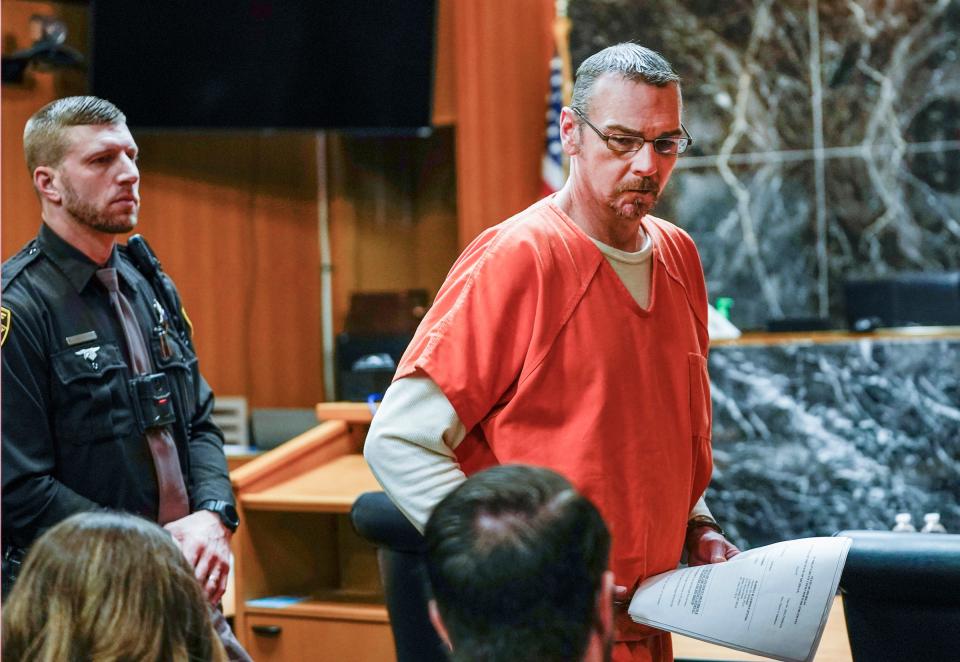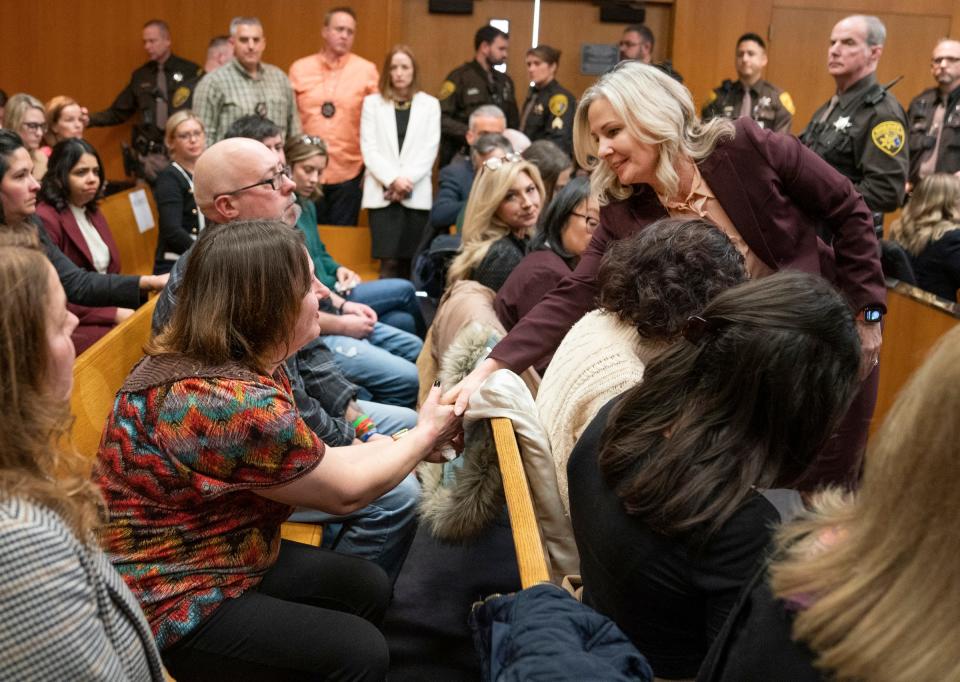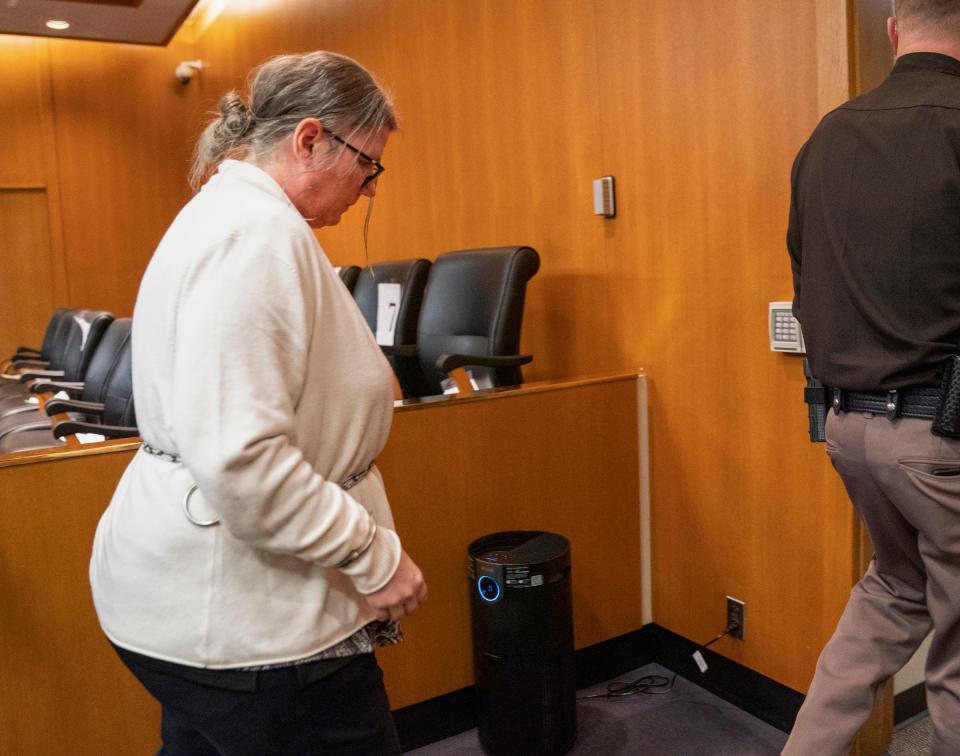'My dad told me to suck it up': How James Crumbley's trial will differ from his wife's
Like his wife, James Crumbley is accused of being a bad parent whose decisions ultimately cost four children their lives — all murdered in a school shooting carried out by his son.
But unlike his wife, James Crumbley made one key decision that prosecutors are likely to focus on as he goes to trial in part two of the historic case: He took his son on a Black Friday shopping trip in 2021 and bought a gun the teen had long begged for, the same one Ethan Crumbley would use four days later to shoot up his high school.
According to his wife's testimony in her trial, James Crumbley also was responsible for storing the gun.
As veteran criminal defense attorney Bill Swor said of the gun purchase: "I think it's a real problem for him."

On Tuesday morning, after more than two years behind bars, James Crumbley will be the third and final member of his family to face the justice system over a mass school shooting that left four children dead and seven other people injured, including a teacher.
Father's claim on firearms forms likely to come up at trial
The prosecution maintains this case hinges on a lot more than James Crumbley buying the murder weapon. He also made multiple missteps, prosecutors argue, similar to the ones that were cited in his wife's trial, which ended last month with Jennifer Crumbley being convicted of involuntary manslaughter and making history as the first parent in America held criminally responsible for a mass school shooting carried out by their child.
James Crumbley now faces the same charges as prosecutors argue he and his wife, through their gross negligence, caused the deaths of Tate Myre, 16; Hana St. Juliana, 14; Madisyn Baldwin, 17, and Justin Shilling, 17. Their son pleaded guilty to murder and other charges against him and was sentenced to life in prison without the possibility of parole.
Prosecutors allege both parents ignored a troubled child who was in crisis and spiraling downward, but instead of getting him help, they bought him a gun. The parents have maintained that they never saw any signs that their son would harm anyone or shoot up his school and that the gun wasn't really a gift, but that it was hidden and to be used only at the shooting range with his father, his mom testified.
Former federal prosecutor Mark Chutkow, who has closely followed the case, said the prosecution will counter that the dad bought the gun for his son, then certified on the firearm forms that he was buying the gun for himself. It will emphasize that the dad was the one responsible for safely storing and securing the gun at home, but failed to do so. Finally, he said, the prosecution will argue that the dad was equally privy to the most important red flags of their son’s deteriorating mental health, his fascination with guns and was present with the mom at the pivotal meeting where the school officials revealed the son’s disturbing drawing of gun violence and desperation.
Will James Crumbley testify?
Chutkow expects the defense to ask more probing questions about gun ownership during jury selection, given half the jurors in his wife's trial owned guns, while nine grew up with guns. Jury selection was concluded in two days in the wife's trial. The father's defense team won three additional peremptory challenges of jurors, giving each side eight strikes to dismiss prospective jurors without giving a reason.
Chutkow also said the prosecution "still has a challenging case" to prove — that the dad was grossly negligent in handling the gun and reasonably foresaw that his son might use the gun to harm others. "But the prosecution now has a successful playbook, based on the mom’s conviction," he said, "and will similarly emphasize in this case the various times the parents failed to take steps to protect their son and to warn others."
That's precisely what Oakland County Prosecutor Karen McDonald stressed in her closing argument at the mom's trial, when she argued the parents could have told the school their son had access to a gun, could have brought him home on the morning they saw that troubling drawing or even pulled him aside and talked to him.
But the Crumbleys did none of those things, she said.

"The tragic part about it is none of it was hard. None of it," McDonald said. "The smallest thing, just the smallest thing, could have saved Hana, and Tate and Justin and Madisyn."
The Free Press has followed this case for more than two years, during which prosecutors have disclosed scores of allegations against the parents based on journal entries, text messages, social media posts, Instant Messenger conversations, and interviews with police and psychiatrists who spoke to the shooter after the massacre.
While much of that alleged evidence applies to both parents, prosecutors will shift the focus this go-around on James Crumbley, whose lawyer has not yet disclosed whether he will take the stand. His wife did testify, though legal experts have opined that Jennifer Crumbley may have hurt herself by coming across as too cold, and telling the jury that looking back, she would not have done anything differently.

"The defense will think twice before putting the dad on the stand, given that the mom probably didn’t help herself by testifying," Chutkow said.
"The defense will try to paint a more sympathetic portrait of the dad as a struggling DoorDash driver who was devastated about what his son did — to contrast him from the mom, who may have come across as more self-absorbed and aloof," Chutkow said.
'Dad didn't do a good job of hiding it from his son'
Chutkow also anticipates that the defense will emphasize that the dad wasn’t as aware of his son’s alleged "downward spiral" because the son was texting mostly with his mom about his mental distress. And the dad wasn’t part of some of the more damaging texts, like when the mom texted her son "LOL" and told her son not to get caught searching for ammunition online at school.
Veteran criminal defense attorney Art Weiss doubts the prosecution will dramatically alter its approach in the James Crumbley trial, though he believes this case will focus heavily on how the weapon was stored.
"Obviously, Dad didn't do a good job of hiding it from his son," Weiss said, stressing that the jury will likely hear a lot about what steps the dad did or didn't take to keep the gun away from his son.
James Crumbley has long maintained that he never saw anything that would lead him to believe his son was homicidal and that the gun was secured in his bedroom armoire, unloaded, with the bullets hidden in a separate drawer.
Expert: Key difference in dad's trial is a new jury
Michael Bullotta, a former federal prosecutor in Detroit and California who has handled high-profile corruption and drug cases, said the key difference in the two Crumbley trials will be the folks who decide it.
With a different jury, he said, there's no telling how the prosecution's narrative will land with this group.
"Think of it like a stand-up comic doing his act for the evening crowd," Bullotta said. "All of his jokes work. … But then he tries the same material the next night in front of a totally different audience … and the comic bombs.
"That same phenomenon can happen in trials involving the same fact pattern, same witnesses and same prosecutors," Bullotta said.
The other big difference with the dad's trial is that both sides now have a roadmap left from the mom's trial, though he believes the defense might hold a slight advantage on this end. That's because the prosecution has seen only how the mom attacked its case, not the dad, whereas James Crumbley will have a blueprint of the prosecution's strategy, which, he said, is "something unlikely to change given the successful result in Jennifer's trial."
Shooter: My dad said to 'suck it up'
In the mother's trial, the prosecution cited multiple text messages between the mom and the son. But since the shooting, no text messages or communications between the son and the dad have been cited as evidence of parental neglect.
Rather, in building its case against the dad, the prosecution is relying in part on the boy's journal and text messages he sent his friend months before the massacre, including these:
"like I hear people talking to me, and see someone in the distance," the shooter texted his friend in the spring of 2021. "I actually asked my dad to take me to the doctor yesterday, but he just gave me some pills and told me to suck it up. My mom laughed when I told her”
"I’m having bad insomnia … and paranoia," the boy texted the same friend after midnight that same spring. "I need help … I was thinking of calling 911 so I could go to the hospital … but then my parents would be really pissed."
"I’m going to ask my parents to go to the doctor again," the boy texted his same friend that spring. "but this time I’m going to tell them about the voices … I’m mentally and physically dying”
The defense has argued that neither parent ever saw those messages. The parents deny their son ever made such pleas to them. The defense also has stated in court documents that the shooter allegedly told a psychiatrist — according to a note in his medical file — that he lied to his friend when he said he asked his parents for help and that they ignored him. But the judge has excluded any of the shooter's confidential medical records from being admitted at trial given he has declined to testify in his parents' trials and has not waived any privilege to his medical records.
The troublesome journal entries
The following journal entries could also prove problematic for James Crumbley, as the jury foreperson in his wife's trial told the media that the journal "played a huge part" during deliberations. Among the excerpts to be cited at trial:
"I will cause the biggest school shooting in Michigan’s history. I will kill everyone I f------ see," the shooter's journal reads: "I have fully mentally lost it after years of fighting my dark side. My parents won’t listen to me about help or a therapist."
"I have zero help for my mental problems and it's causing me to shoot up the f------ school.”
These excerpts also could prove problematic for the dad:
"All I need is my 9 mm pistol which I'm currently begging my dad for."
There's also mention of the gun purchase in the boy's journal.
"First off I got my gun. It's a SP2022 Sig Sauer 9 mm ... The shooting is tomorrow. I have access to the gun and ammo."
The shooter also bragged about the gun on social media. On the day his dad bought the weapon from Acme Shooting Goods in Oxford, the shooter posted a photo on Instagram of himself holding the semi-automatic handgun, writing: "Just got my new beauty today. SIG SAUER 9mm."
But another journal entry that could help the father, however, though it's unclear when the shooter wrote it. It reads:
"I will have to find where my dad hid my 9 mm before I can shoot up the school."
The judge did not allow that entry to be read at the mother's trial. It remains uncertain as to whether jurors in the father's trial will see it. Defense experts argue this is a key issue in James Crumbley's case — that he did not give his son easy access, as the prosecution has alleged.
As Weiss has argued: "If it really was the boy's gun, then why did the parents have to hide it?"
Dad: 'I thought you were giving him a Xanax'
In trying to prove that the dad knew his son was mentally struggling, but was more focused on his own life, the prosecution has produced a conversation the Crumbleys were having on Facebook Messenger months before the shooting.
"You awake? … Ethan awake?" the wife wrote to her husband at 9:37 a.m.
"um, yeah," the husband responded.
"How is he?" the mom asked.
"He woke up looking up like he had WAY too much to drink last night. complained about a headache," the dad stated.
"Well, he was really worked up and out of control so i can see why," the mom wrote back. "All i know is he needs to eat. go to work, and work hard and not complain."
Later came talk of their son taking medications.
"I totally thought you were giving him a Xanax last night," the dad messaged.
"Does he seem better? no melatonin," the mom responds.
Without elaborating, the mom also asks her husband:
"Does he remember what he did?"
The dad says he's too busy to answer, writing "Dude, i am working on a demo right now."
James Crumbley comes off as more emotional than mom
According to courtroom testimony and videos shown in court, James Crumbley came across as more emotional toward his son — and potentially more supportive — than his wife. He is seen and heard crying often, and offering comfort to his son, which legal experts have said could help him at trial.
For example, when the Crumbleys were summoned to the Oxford High counselor's office on the morning of the shooting over a troubling drawing their son had made, the mom said nothing to her son. But the dad, according to the counselor, told his son: "You have people you can talk to. You have your counselor you can talk to. You have your journal."
And after the massacre, when the parents were being questioned in a police substation, James Crumbley was the one who was sobbing with his face in his hand, and telling his son that he loved him repeatedly. His wife was composed, asking "Why, Why?"
James Crumbley also was the one crying in the back of a police cruiser, telling his wife to remember that he loved her if anything happened. She said nothing in return.
The father's actions in the hours before and after the shooting will also play heavily at his trial, as prosecutors have argued he should have connected the dots about what was about to happen.
For example, after his wife got a call from Oxford High School about a troubling drawing her son had made in geometry class, she sent her husband this message: "Call NOW. Emergency."
The drawing included a picture of a gun, a human body bleeding, and the words, "The Thoughts won't stop. Help me."
James responded with "WTF" and then sent a message to his wife about the couple's horse having a medical issue.
At 10:41 a.m. that day, the Crumbleys arrived at the school, met with the counselor and their son, who returned to class. The Crumbleys went back to their jobs. James Crumbley made a DoorDash delivery.
About two hours later, their son fired his first shot. An active-shooter alert went out to parents. James Crumbley called his wife and immediately drove home, where he discovered the gun and ammo were missing.
At 1:34 p.m. that day, James Crumbley called 911 to report the missing gun, and told police he believed his son had taken the gun to the school. By then, the rampage was over.
Tresa Baldas is an award-winning courts and legal issues reporter who received a 2023 Wade H. McCree Advancement of Justice Award by the Michigan Press Association and was named the 2020 Richard Milliman "Michigan" Journalist of the Year by the Michigan Press Association. Contact her at tbaldas@freepress.com.
This article originally appeared on Detroit Free Press: James Crumbley trial to differ from wife's over Oxford school shooting

